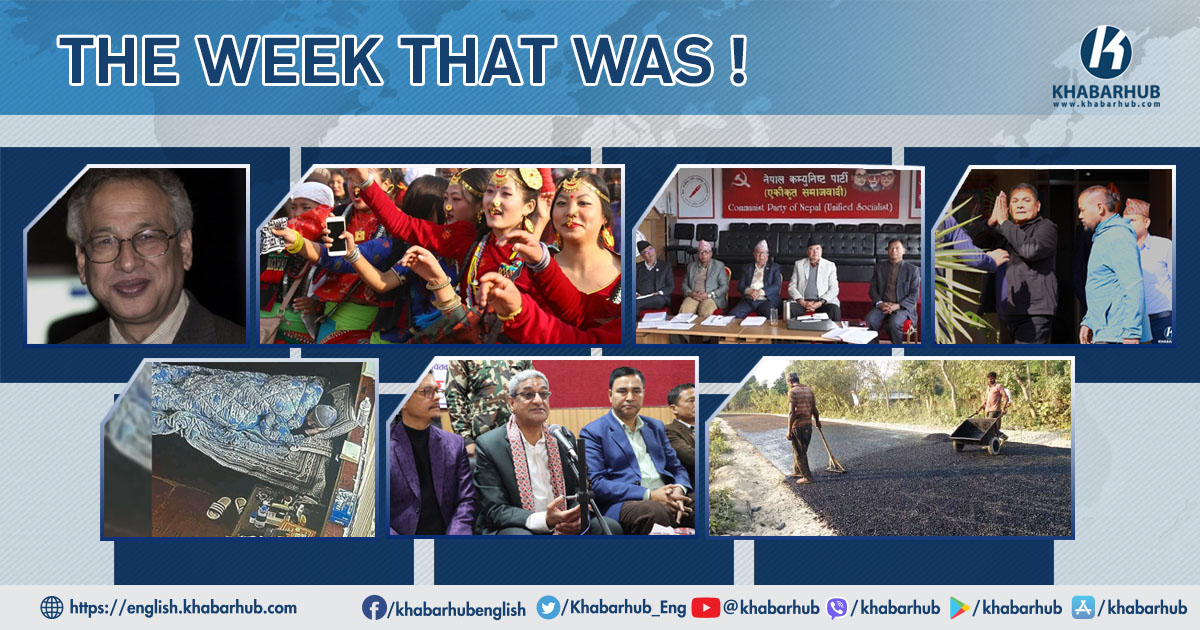KATHMANDU: Last week’s events in Nepal illustrated a fascinating mix of political developments, legal battles, cultural celebrations, and infrastructural progress, reflecting the complexity and volatility of the country’s socio-political fabric.
PM Oli asserts govt stability
Prime Minister KP Sharma Oli’s defiant comments regarding the stability of the current government, formed through a coalition between CPN-UML and Nepali Congress, were a clear rebuttal to growing speculation that the coalition might crumble under opposition pressure.
Oli’s remarks, where he likened critics to “flies” unable to harm a “bull,” were aimed squarely at the Maoists and Rastriya Swatantra Party (RSP), whom he accused of attempting to destabilize the government.
His rhetorical flourish underscored his belief that the government, formed with the goal of achieving political stability and economic prosperity, is built on a solid foundation and will not be toppled merely by criticism.
This statement came at a time when the political scene in Nepal is increasingly marked by fragmentation and infighting, with smaller parties challenging the larger ones.
Constitutional amendments through political consensus
In the broader context of political governance, Home Minister Ramesh Lekhak’s assertion that any amendments to Nepal’s constitution would require broad political consensus demonstrated the government’s commitment to inclusivity, signaling that the government does not intend to bypass opposition parties in reform processes.
Lekhak’s statement underscored a pragmatic approach to constitutional change, acknowledging the necessity of involving all political forces to strengthen Nepal’s federal democratic republic.
The idea of constitutional amendments, while often contentious, remains a key area of focus as Nepal continues to navigate its post-constitutional transition and the challenges of balancing ethnic and regional diversity with national unity.
Supreme Court orders release of Durga Prasai
The Supreme Court ordered the release of Durga Prasai on Friday last week. A joint bench comprising Justices Nahakul Subedi and Saranga Subedi issued the order for Prasai’s release.
The court’s decision came after hearing a writ of habeas corpus filed on behalf of Prasai, as confirmed by spokesperson Achyut Kuinkel. Prasai had been charged by the Cyber Bureau of Nepal Police for electronic crimes.
Udhauli festival: Cultural pride on display
Amidst these political dynamics, the country also saw the celebration of the Udhauli festival, one of the most significant events for the Kirat community.
This cultural observance, which marks the transition from highland to lowland, is more than just a traditional celebration; it’s a vital expression of the diverse ethnic heritage that defines Nepal.
The festival’s connection to the agricultural cycle reflects the country’s deep roots in agrarian practices, while the collective spirit of the Kirat community underscores the importance of shared rituals and social cohesion.
Such cultural events remind the nation of its rich traditions and serve as a moment for various communities to reaffirm their identity, especially in a political landscape where ethnic inclusivity remains a sensitive issue.
Former Mayor PL Singh passes away
On a more somber note, the death of former Kathmandu Mayor PL Singh brought attention to the contributions of one of Nepal’s key democratic figures.
Singh, a long-time associate of Ganeshman Singh in the struggle for democracy, had become a prominent political figure in Kathmandu, and his passing marked the end of an era in Nepal’s political history.
His death highlighted the generational shifts in leadership and the ongoing evolution of Nepal’s political landscape, which continues to be shaped by the legacies of past struggles for democracy.
Unified Socialist announces leadership changes
The reshuffling within the Unified Socialist party also signaled the ongoing restructuring within Nepal’s political parties as they adjust to new realities.
The appointment of key figures to strategic departments within the party was part of an internal realignment aimed at strengthening the party’s position within the broader political landscape.
Such moves indicate the fluidity of party politics in Nepal, where leadership dynamics and internal shifts often coincide with the broader national political climate.
Prasai’s petition dismissed, Lamichhane photo scandal escalates
In the realm of law and order, the legal proceedings involving Durga Prasai and the controversial photo of Rabi Lamichhane, both of which were hotly debated last week, demonstrated the tension between media freedom, personal privacy, and legal accountability.
The Supreme Court’s dismissal of Prasai’s writ petitions cleared the way for banks to recover loans, shedding light on the continuing complexities of the country’s legal and financial systems.
Meanwhile, the cybercrime charges stemming from the unauthorized publication of Rabi Lamichhane’s photo revealed the growing intersection between media practices and digital law in Nepal.
Lamichhane, whose political career has been marked by both rapid rise and legal troubles, remains a polarizing figure, and these legal battles are reflective of the broader challenges of balancing individual rights with public interest and privacy.
Road closure for Sisneri-Dakshinkali blacktopping
Meanwhile, while political drama, legal disputes, and cultural celebrations made headlines, the closure of key roads for infrastructure development, particularly the Sisneri-Dakshinkali road, highlighted the government’s ongoing commitment to enhancing national connectivity.
Such infrastructural projects are essential not only for economic growth but also for fostering a sense of national unity, as they improve access between urban centers and rural areas, a critical factor in a geographically diverse country like Nepal.
Taken together, last week’s events provide a snapshot of a nation in transition. While Nepal grapples with political polarization, legal complexities, and ethnic diversity, it also continues to make strides in its quest for economic development, cultural expression, and democratic stability.
The interplay between these various elements—political, legal, social, and infrastructural—will continue to shape the future of the country, and the events of the past week serve as a reminder of the challenges and opportunities that lie ahead for Nepal as it navigates this turbulent yet transformative period in its history.









Comment